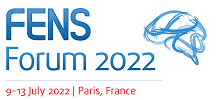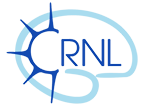
The Young Investigator Training Programme is organised by the Société des Neurosciences Host Society Committee (HSC) and sponsored by IBRO-PERC.
It consists of 2-3 week placements in host laboratories around France prior to the FENS Forum in Paris. As part of the programme, the selected researchers will have the opportunity to work within defined research environments in France in order to get familiarised with different facilities and techniques in neuroscience, as well as expanding their research network. Full information about the programme can be found on the FENS website : https://forum.fens.org/young-investigator-programme/
Specific offers of Teams of the CRNL for the FENS-22 Young Investigator Training Program
COPHY (Computation, Cognition and Neurophysiology)
We study neuronal communication and encoding (e.g. the functional role of oscillations) in relation to brain disorders and to guide the design of neurotechnologies (brain-computer interfaces) for research and clinical applications (Autism, ADHD, Disorders of consciousness). Beside behavioural and classical neuroimaging approaches (electrophysiology, fMRI), we use multimodal high resolution neuroimaging (e.g. laminar MEG and fMRI) and advanced computational modelling (e.g. dynamic causal models of neuronal and cognitive processes; spiking/deep neural networks).
Website : https://www.crnl.fr/en/equipe/cophy
Contacts : Jérémie Mattout (jeremie.matout@inserm.fr), Mathilde Bonnefond (mathilde.bonnefond@inserm.fr)
FLUID (Fluids and Barriers of the Central Nervous System)
Using in vivo and ex vivo approaches, and cellular models of the blood-brain and blood-CSF barriers, the team investigates the mechanisms involved in transport processes and neuro-immune interactions at blood-brain interfaces in physiological and pathological condition, with a special focus on the perinatal and postnatal periods of brain development.
Website : https://www.crnl.fr/en/equipe/fluid
Contact : Jean-François Ghersi-Egea (jean-francois.ghersi-egea@inserm.fr)
GENDEV (Genetics of Neurodevelopment)
The team, which comprises clinicians, molecular geneticists/biologists and bioinformaticians, deciphers the genetic causes of neurodevelopmental disorders through the studies of cohorts of families, patients' cells, animal (zebrafish) and cellular (IPSC, brain organoids) models.
Website : https://www.crnl.fr/en/equipe/gendev
Contacts : Sylvie Mazoyer (sylvie.mazoyer@inserm.fr), Patrick Edery (patrick.edery@chu-lyon.fr)
IMPACT (Integrative Multisensory Perception, Action and Cognition)
We study the behavioral processes and neural mechanisms of auditory, visual and tactile perception, motor planning and execution, cognitive representations and executive control, all critical components of human behavior. In collaboration with the CRNL Neuro-immersion facility, we develop and use cutting-edge technology for Virtual Reality and 3-D kinematics in healthy subjects and patients, complemented by neuroimaging and electrophysiology in human and non-human primates.
Website : https://www.crnl.fr/en/equipe/impact
Neuro-immersion platform demo https://www.youtube.com/watch?v=dtlVOFARE3g
Contacts : Alessandro Farnè (alessandro.farne@inserm.fr), Denis Pélisson (denis.pelisson@inserm.fr)
SLEEP (Pathophysiology of the Vigilance States)
Our research strategy carried out in various species (rat, mice, lizards, birds, chameleons, humans etc) is to disentangle brain networks and biological mechanisms generating sleep and its natural alternation with wakefulness, to unravel either physiological, functional and cognitive functions of sleep and to understand the dysfunctional mechanisms underlying different pathologies affecting sleep (ie. RBD, narcolepsy) with well-documented negative impacts on both health and quality of life of human beings. Our projects and experimental approaches are multidisciplinary, translational and by definition integrative.
Techniques: Full EEG/LFP analysis, in vivo electrophysiology (head restrained or freely moving mice) functional neuroanatomy, sleep recordings
Website : https://www.crnl.fr/en/equipe/sleep, https://lyonsleeplab.cnrs.fr/
Contacts : Christelle Peyron (christelle.peyron@univ-lyon1.fr), Pierre-Hervé Luppi (pierre-herve.luppi@univ-lyon1.fr)
BELIV (Bio-electro-chemistry platform), TIGER (Translational and Integrative Group in Epilepsy Research),
We develop innovative brain monitoring methods relying on implantable chemical sensors and microelectrode biosensors for glucose, oxygen, lactate, glutamate and nitric oxide monitoring. These methods are implemented in our research team to study experimental models of traumatic brain injury and stroke in rats, and understand the mechanisms of epileptogenesis and lesion progression.
Website :
Contacts: Stephane Marinesco (stephane.marinesco@univ-lyon1.fr), Baptiste Balança (baptiste.balanca@gmail.com)
WAKING (Integrated Physiology of the Brain Arousal Systems)
Our goal is to unravel the mechanisms of wakefulness and associated sleep/wake pathologies, combining both basic and translational research. Wakefulness - as well as sleep - is a highly integrative function that relies on dedicated neuronal networks and is modulated by ongoing behavioral, neurodevelopmental, environmental, as well as cellular, molecular and metabolic signals. We thus investigate the brain arousal systems and regulatory networks in various behavioral contexts during waking, its impact on the local regulation of cortical activity and on molecular/genetic signaling in mouse and drosophila models.
Our human and clinical research investigates how sleep, wakefulness and non-visual functions are regulated by light and the circadian clock. It also addresses the impact of sleep and sleep disorders on human health and neurodevelopment. We also investigate physiopathology and therapy of sleep/wake disorders, notably narcolepsy and excessive daytime sleepiness.
Website : https://www.crnl.fr/en/equipe/waking
Contacts : Laurent Seugnet (laurent.seugnet@inserm.fr), Jian-Sheng Lin (jian-sheng.lin@univ-lyon1.fr)











